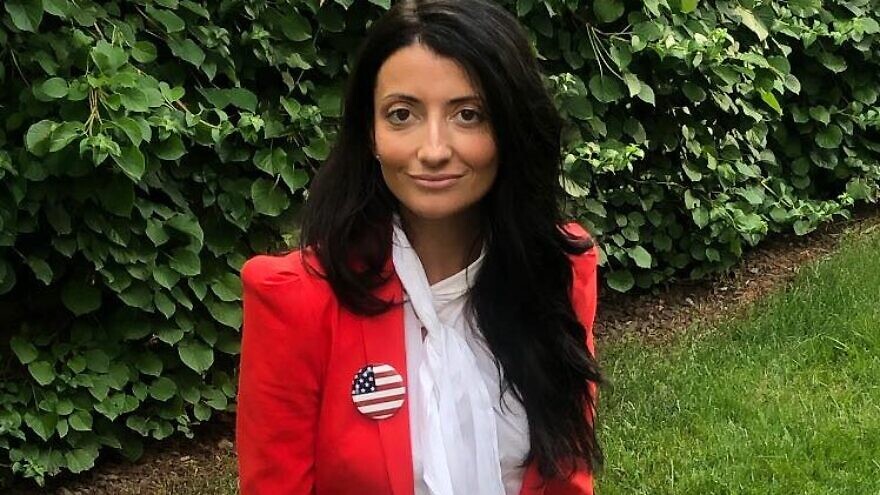|
Getting your Trinity Audio player ready...
|
NYC Council’s Ban on Political Signs Includes Israeli Hostages Posters; Sparks Debate Over Free Speech
Edited by: Fern Sidman
In a contentious move, New York City Council Speaker Adrienne Adams has directed lawmakers to remove all political signs from their desks, including pro-Israel posters and flyers, as was reported by the New York Post on Wednesday. This decision has sparked significant outrage among council members, with some viewing it as an infringement on their freedom of expression.
The directive was first proposed during a conference with other council Democrats on Monday. Speaker Adams, who is not related to Mayor Eric Adams, initiated the plan in an effort to mitigate the heated rhetoric between lawmakers over the Israel-Hamas conflict, according to sources, the Post reported. The council’s general counsel formalized the directive in a memo on Wednesday, informing members that they could no longer “affix on furniture or otherwise display signs or flags” in the chamber or during any meetings without prior approval from the speaker.
The directive has been met with strong opposition from several council members. Councilwoman Inna Vernikov (R-Brooklyn) was particularly vocal, criticizing the move as a blatant power play. “This is a shameful, disgusting excuse of a power flex, used to curtail my freedom of expression,” Vernikov declared, as was indicated in the Post report. She emphasized the constitutional right of her colleagues to display signs, regardless of differing opinions. “My colleagues have a constitutional right to hang a ‘Cease-fire now’ poster, no matter how much I disagree with them. I have a right to display a poster of a hostage, no matter how much my colleagues disagree with my message,” she asserted, according to the report in the Post.
Historically, council members have used signs and displays on their desks to express political views or make points during meetings. However, the information provided in the Post report said that the practice has become increasingly contentious amid the ongoing war between Israel and Hamas terrorists in the Gaza Strip, with displays supporting both sides of the conflict appearing in the chamber.
Council leaders have defended the directive, stating that the ban on political signs has always been part of the chamber’s guidelines and Robert’s Rules of Order, which are widely accepted parliamentary procedures, as per the Post report. “This is a common type of regulation observed by many legislative bodies at the state and federal level,” a spokesperson for the council explained.
As the conflict between Israel and Hamas continues to provoke strong emotions and opinions, legislative bodies across the country are grappling with similar issues. The directive in New York City reflects a broader trend of legislative bodies seeking to regulate expressions of political views to maintain order and focus on legislative duties.
Officials defending the directive have cited the historic and irreplaceable nature of the council members’ desks. They argue that affixing signs and posters to these desks could cause damage, justifying the need for the ban, as was detailed in the Post report. While the preservation of historic furniture is a valid concern, the move has sparked fears of setting a dangerous precedent that could stifle political discourse.
Despite these preservation concerns, the directive has faced significant opposition from some council members who see it as an infringement on their right to free speech. Councilman Kalman Yeger, a Brooklyn Democrat, was particularly vocal in his criticism. “There is no member of the council to determine unilaterally what members put on their desk,” Yeger stated, according to the Post. He expressed his intention to defy the directive by putting his signs back up.
Yeger’s stance reflects a broader sentiment among some lawmakers who view the ban as an encroachment on their ability to express political views. This sentiment was echoed by another council member who spoke to The Post, emphasizing that political positions among politicians are a normal part of democratic discourse. “Curbing free speech sets a dangerous precedent,” the source warned, as was noted in the Post report. The source added that while there is a need to lower the temperature in the chamber, the approach taken by the speaker threatens fundamental democratic principles.
The directive comes at a time when the Israel-Hamas conflict has heightened political tensions within the council. Displays of support for both sides of the conflict have appeared in the chamber, contributing to a charged atmosphere. The Post reported that a council source criticized progressive members for what they described as “militarizing” their causes and making them overly political, which has forced other members to deal with the fallout.
Despite the backlash, council sources expect that all signs will be removed by Thursday. The council spokesperson defended the directive, noting that similar regulations are observed by many legislative bodies at the state and federal levels, the report added. This adherence to broader legislative practices aims to ensure order and decorum within the chamber.





